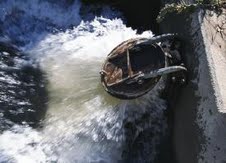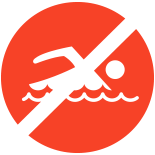CSO Grant McConachie Way
Vancouver, British Columbia, Canada

While Vancouver is changing from a combined to a separated sewer system, combined sewer overflows (CSOs) still exist; they collect rain and sewage in the same pipe. According to Vancouver.ca, the city's goal is to eliminate sewer combined sewer overflows by 2050.
Pollution Control (from Vancouver.ca):
1. Don't pour anything down the drain on your street. Some community members mark a yellow fish symbol at street drains to remind people.
2. Dispose of grease in the garbage, not down your sink.
3. Dispose of unused pharmaceuticals by returning them to the pharamacy, not rinsing them down your drain. Also, Vancouver does not have anything but primary treatment of waste, which just "gets the lumps out" -- chemicals go back into the water.
4. Do not wash your vehicle on the street or in your driveway, as suds end up in the street drain. Go to a carwash or a non-paved surface for washing your car instead.
The use of CSOs, especially combined with heavy rainfall (we get this a lot in Vancouver!), are dangerous because CSOs can release into nearby surface waters due to inadequate, old pipes not being large or sturdy enough to handle increased flows. This raw waste (which is worse in warmer water temperatures) creates a breeding ground for E.coli, coliforms, and algal blooms. It also can allow dangerous chemicals, viruses, oils, and debris into nearby water areas.
The description above was copied from or heavily based on Swim Guide, with permission.
More Information
- Swim Guide - Weather and water quality for CSO Grant McConachie Way and 8,000 other beaches.







